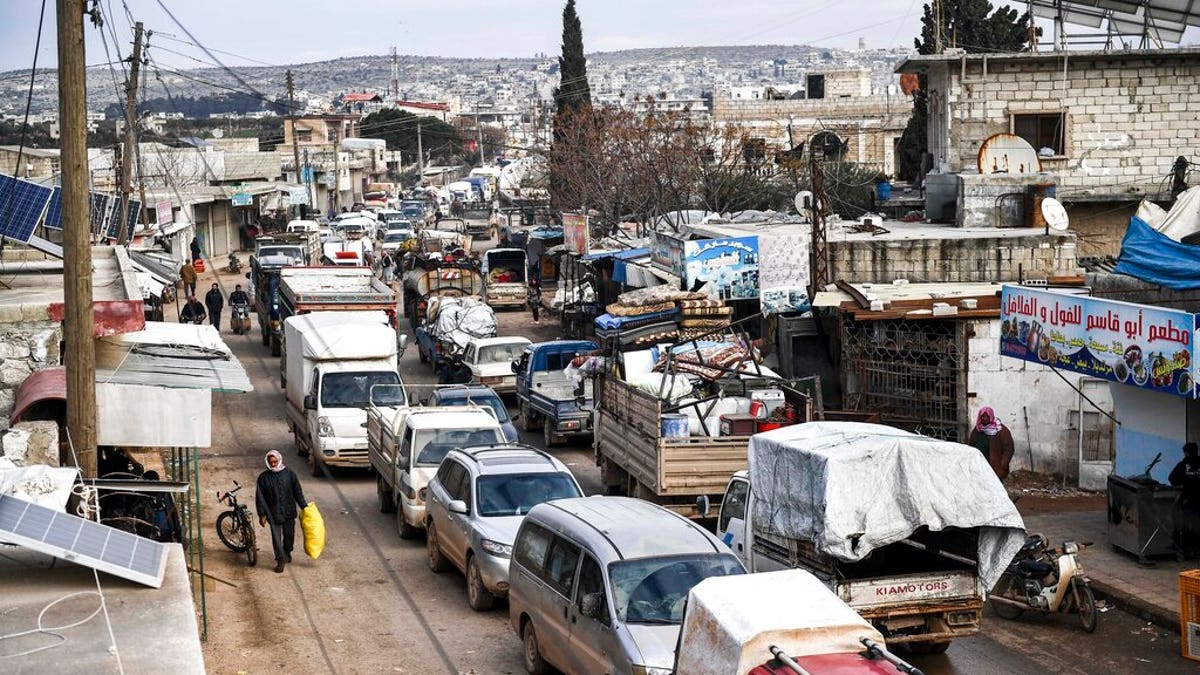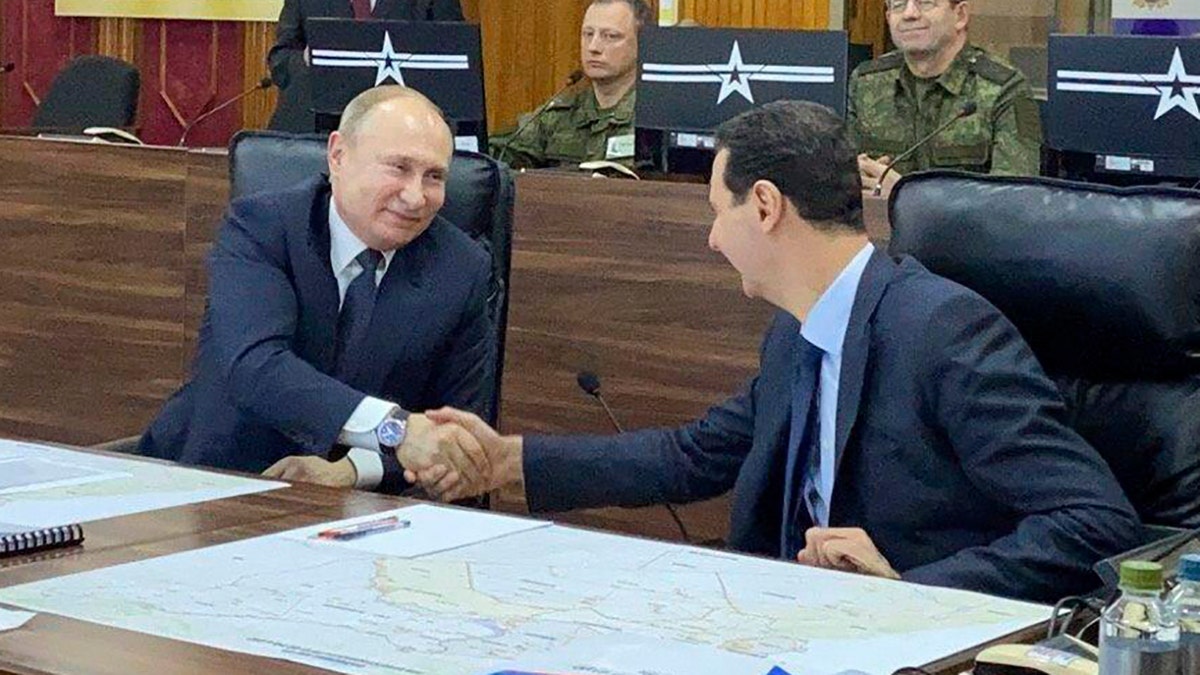
A family lives in a graveyard in Idlib, the last rebel stronghold in the Syrian Civil War (Ibrahim Alyahya)
The number of dead continues to pile up in a country that was once one of the most beautiful on earth. The fear of death is never far from the mind of survivors. And some are even forced to live among those who have departed – with nowhere left to go as the last opposition-bastion of Syria’s Idlib is laid to waste.
“We tried to flee to a camp, but we couldn’t find a tent. All camps were full,” lamented Fadi Abo Yosef, who hails from the village of Jabal al-Zawiya. “Some villages guided me to this room and asked me if I can live among graves. I prefer to live among the dead than to risk my children to die from the cold.”
For weeks, Yosef and his wife and several small children have been living in a nondescript shack on the edges of a graveyard.

Fadi Abo Yosef and his family (Ibrahim Alyahya)
“I fear graves, I fear them so much,” one child cries, as another tries to stay strong.
“We can’t help but have nightmares and feel afraid,” the child says. “But it’s the only solution we have got.”
SYRIAN REGIME ACCUSED OF DOZENS OF TORTURE METHODS FROM 'CRUCIFIXION' TO RAPE TO EYE-GOUGING
This week marks nine years since the outbreak of the Syrian civil war, which ignited out of a peaceful protest against the family reign of Bashar al-Assad. And for many still trapped inside the blood-soaked country, in which some half the population has been displaced and over a million individuals from all walks have lost their lives, the worst is yet to come.
“[People] lack the basics of life, and the biggest losers are children who suffer from the lack of schools and medical care,” Ibrahim Alyahya, a 34-year-old Syrian activist who shot the graveyard footage, told Fox News from his own overcrowded displacement camp on the sealed Syrian-Turkey border. “There is a fear of [more] bombing. Millions of people live in difficult medical and humanitarian conditions.”
The notion that every breath could be your last is palpable.
“The situation is getting worse for several reasons. The most dangerous is the current spread of COVID-19 virus, and most medical centers are stopping their services as they have been targeted several times by Syrian and Russian forces,” said Fadel Ghany, chairperson of the Syrian Network for Human Rights. “This had led to destruction in equipment and centers. There is also a clear shortage of bathing water; there just isn’t enough water.”

Civilians flee from Idlib toward the north to find safety inside Syria near the border with Turkey, Saturday, Feb. 15, 2020. Syrian troops are waging an offensive in the last rebel stronghold. (AP Photo)
For much of the past year, Idlib – the last opposition bastion – has been pummeled by Russian and Syrian jets and brought to its knees by Damascus-ordered troops on the ground.
Conditions are critical. The remnants of a biting winter remain as temperatures dip below freezing, and sick and starving families cram together and purport to keep themselves warm beneath the elements as bombs fall – with nowhere left to run.
According to the International Committee of the Red Cross (ICRC) more than 11 million Syrians are now dependent on aid, tens of thousands of people remain missing in the rubble of conflict, and since December alone some one million people have been forced to flee Idlib as the theater of war intensifies, “creating the worst wave of displacement of the conflict.”
Turkey and Russia have signed a string of temporary truces over the course of the last year in the quest to reach a peaceful agreement, although routinely riddled with violations. Some are simply waiting for the inevitable: an all-out assault.
Jett Goldsmith, a Syria and geopolitical analyst for the open-source monitoring site Bellingcat, stressed that the situation in Idlib is an especially unique one.
“Whereas we've seen displacement happening all over the world, and refugee outflows drastically impacting social policy in Europe and the West, that same displacement is happening en masse in northern Syria on an unseen scale, as refugees are pushed not outwards but inwards,” he explained. “Towards an increasingly narrow strip of land which serves as a sort of purgatory for the constant murmur of a military offensive cast over the region.”

This image released by the Syrian Presidency shows Russian President Vladimir Putin, center, meeting with Syrian President Bashar Assad, right, in Damascus, Syria on Tuesday, Jan. 7, 2020. Putin's visit is the second to the war-torn country where his troops have been fighting alongside Syrian government forces since 2015. (Syrian Presidency via AP)
Goldsmith noted that Hayat Tahrir ash-Sham, the formerly Al Qaeda-linked terror group, governs the province – but only nominally, “as it doesn't maintain the control or influence to be able to effectively assert itself over the vast majority of the civilian population, and it lacks the structural capacity to assert a meaningful counteroffensive against regime coalition forces.”
“This means the situation is novel and unique in a way we haven't seen before: Civilians are truly trapped in a sense of overwhelming purgatory, whereby they're forced to within arm's length of the Turkish earthen berm which demarcates the border,” he underscored. “Unable to control their own destiny.”
WHAT COUNTRIES HAVE NOT DECLARED ANY KNOWN CASES OF CORONAVIRUS?
As for the United States, the government’s vocal stance has remained firmly on the side of the civilians caught in the crossfire of the heavy bombardment and decades of oppression.
“The United States will not spare any effort to deliver the relief, the resources, and, ultimately, the peace that has been kept from you for far too long,” UN Ambassador Kelly Craft wrote on Twitter late last month. “We cannot allow today’s headlines to define Syria’s future.”

The U.S. State Department, moreover, is said to be preparing even more scathing economic sanctions against the Assad regime. Nonetheless, the future remains painfully grim.
“Syria will be a failing state for a long time from now, with or without Assad. Most of the infrastructure has been destroyed, the educated people have left, and warlords are in charge all over the country,” said Bassam Barabandi, a former Syrian diplomat and now founder of the activist group People Demand Change. “Humanitarian aid will not solve this problem.”
And as Fadi turns his face to the fading winter sunlight, a row of crumbling headstones in his periphery, he pulls his tiny daughter closer.
“I try my best to convince [my family] that the dead are harmless,” he adds. “We tell them God will stop Bashar, Russia, and Iran from killing us.”








































